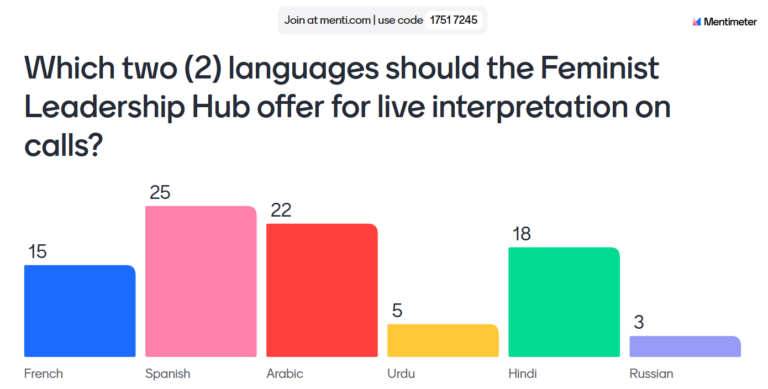TAKING A STEP TOWARDS LANGUAGE JUSTICE
A key part of building an international feminist space like the Feminist Leadership Hub is recognising the structures that have made such spaces inaccessible to many: fees to enter or attend virtual or physical spaces; visa restrictions limiting who can travel where; in which time zone online events are held; and, of course, language.
With English as the common language between the Hub consortium (FAIR SHARE of Women Leaders and One Future Collective – itself a result of British colonialism in India), we knew that English would be the first working language of the Hub. This was already a limitation as it impacted who could participate in the conceptualisation phase, but we unfortunately just didn’t have the resources to hire interpreters and translators for that process.
We committed to working towards language justice within the Hub and fundraising specifically for this – and we did it! At the end of 2023, we began a one-year partnership with the Alliance for Gender Equality in Europe with resources dedicated for interpretation and translation.
As it turns out, securing the resources was only the beginning: now, we had to decide which language(s) to integrate into the Hub – a decision that came with many politics and power dynamics, as it would play a major role in which communities could or couldn’t participate in the Hub. So how did we make that decision?
Our process
We noticed that several large, international feminist organisations like AWID, Mama Cash and the Alliance for Feminist Movements offered at least French and Spanish – presumably because they cover large areas (Francophone Africa and South and Central America, respectively). But we couldn’t help but wonder: if most feminist initiatives made the same choice, who was being left out from the international conversation and community?
We considered commissioning research around this question, but due to lack of resources quickly realised we would have to do as much research as possible ourselves. This involves two elements: speaking to other international feminist initiatives/organisations who work in multiple languages, and asking our communities directly.
We looked up the most widely spoken languages which led us to the decision to collect data not only about French and Spanish, but also Hindi, Urdu, Arabic and Russian. We opted not to include Chinese given restrictions on feminist activism and internet usage in the region which might make the Hub inaccessible for reasons other than language.
Since the Hub is a participatory, community-led space we began with asking our pilot community members which second language they would want to see the Hub operate in, via polls within the platform and posts inviting input directly to the Hub email inbox. We also polled the roughly 100 members on the waiting list, before the Hub was launched publicly.
However, we also wanted to reach potential members of the Hub, not only existing ones. So to get more perspectives, One Future Collective and FAIR SHARE both ran polls on their social media accounts.

Decision time
All of this data was collated with the following results, in order of popularity: French, Spanish, Arabic, Hindi, Urdu and Russian. While French and Spanish emerged as the most popular, we still felt pulled not to just go down the path less followed and consider explicitly prioritising an audience that is often left out. This still left a decision: would we choose French or Spanish as our second language, and what would the other language be?
Ultimately, the first decision was pragmatic: we have a native French speaker on the project team who could review translations and edit them as needed. The second decision we decided to postpone, also for pragmatic reasons: offering our community check-ins in an additional language meant our external communications also needed to be bilingual, a transition which would already cost our project team significant capacity. So we decided to begin with French, and then we could incorporate learnings from that process into a potential third language rollout later down the line.
Conclusion
We realise that language is a key part of inclusion, but not the only part – it’s not only about giving previously excluded groups access to something, but being willing to change that space as a result. We are committed to recognising and making space for the different interpretations and practices of feminism that come with different geographical backgrounds. This is how the Feminist Leadership Hub was set up: to be co-shaped by its members, in order to become something that truly reflects and serves their needs and desires.
We will surely make mistakes along the way, but we are glad to be embarking on this multilingual adventure and learning from and with you all in the process. If you have any questions, reflections or feedback, don’t hesitate to reach out to [email protected]!